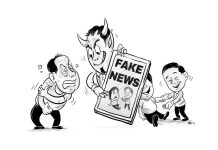[av_one_full first min_height=” vertical_alignment=” space=” custom_margin=” margin=’0px’ padding=’0px’ border=” border_color=” radius=’0px’ background_color=” src=” background_position=’top left’ background_repeat=’no-repeat’ animation=”]
[av_heading heading=’FAITH, HOPE & CHARITY | Saving the environment’ tag=’h3′ style=’blockquote modern-quote’ size=” subheading_active=’subheading_below’ subheading_size=’15’ padding=’10’ color=” custom_font=”]
BY IKE SEÑERES
[/av_heading]
[av_textblock size=” font_color=” color=”]
Thursday, May 11, 2017
[/av_textblock]
[av_textblock size=” font_color=” color=”]
OUR NATURAL resources are part of our environment. We preserve our natural resources, we preserve our environment. It is as basic as that.
Obviously, that is the reason why we combined these two concerns in one agency, the Department of Environment and Natural Resources (DENR). However, the preservation of our environment is one goal; the exploitation of it is another.
While the preservation of the environment is clearly the function of the DENR, exploitation of the environment is not its function, its actual function being the implementation of environmental laws that would govern or regulate exploitation. The balance of these two functions is the delicate role of the DENR, a balancing act that would often lead to some conflicts of interests.
Exploitation of the environment in the form of mining is not illegal per se. It is the violation of environmental laws that is illegal. To state the obvious, mining in accordance with environmental laws is legal, but mining becomes illegal when mining laws are broken.
While it is the function of the DENR to issue mining permits based on franchises granted by Congress, it is also the function of the Department to suspend or cancel these permits if and when the franchise holders are deemed to be in violation of the mining laws.
Strictly speaking, the Congress has no other function after the franchises are granted, except perhaps to exercise its oversight functions. In view of recent events however, we are now reminded that Congress could still exercise its powers in the confirmation of the nomination of the DENR Secretary.
In theory, it could be said that nominee Ms. Gina Lopez was not confirmed because some very powerful interest groups lobbied against her confirmation. If I was naive I would say that that should never have happened because she was just doing her job, in implementing the environment laws, that is.
It could be said that these interest groups, assuming that they are large scale miners should have to reason to block her nomination if their mining practices are within the limits of the laws. But who is to say now about what the limits of the law are really?
As far as I think, exploitation could be allowed, but certainly not destruction or full destruction I should say. Needless to say, exploitation is happening all over the world, but more often than not, the responsible miners in the other countries would exploit but not destroy, and if there is any destruction at all, they would go towards restoration.
Strictly speaking, mining is legal in the Philippines is legal, and so is lobbying. What is illegal is the wrong practice of mining companies in the Philippines to leave the destruction they cause including the pollution, without repairing or restoring it.
In theory, it is not possible to fully repair the damage, but there are compliance standards that are acceptable if and when the repair is within the prescriptions of the law. Mining is an economic activity that could only be stopped if it is banned, but that would require either an executive action or an act of Congress.
Meanwhile, what are needed are the stronger enforcement on the part of the government, and more active vigilance on the part of civil society. Aside from that, there is also a need to strictly enforce lobbying laws, whatever laws are in place right now.
As far as I know, lobbyists have to be registered and their expenses have to be declared. The problem is, very few lobbyists bother to be registered, and it goes without saying that they do not declare their expenses either. In that context, all lobbyists that are not registered could be considered as illegal, and so are their expenses, no matter what form these would take.
When President Rodrigo Roa Duterte said that lobby money was involved in the disapproval of the nomination of Ms. Lopez, many were surprised by what he said, but the truth is, he was simply stating the fact that lobbying does exist, and lobby money does move to influence certain decisions. And now, some lawmakers are calling for the investigation of the supposed lobbying. They should go ahead with that, but in addition to that, they should also review the weaknesses of the existing lobbying laws.
Lopez is now out of the DENR, but that does not mean that her advocacies are dead. Illegal mining is still alive, and so are the other atrocities against the environment. For a long time now, the environment movement has been looking for a leader, an icon who could rally all environmentalists to act as one cause. She might have lost the leadership of the DENR, but she has won the moral ascendancy to lead that environmental movement in all its totality, not only to protect and preserve the mountains, but also the plains, the rivers, the watersheds, the lakes and the seas, as well as the air and atmosphere above all these.
Even if no good thing has come out of her disapproval, a good thing has happened, and that is the emergence of a leader who has the courage to save the environment. (iseneres@yahoo.com/PN)
[/av_textblock]
[/av_one_full]







